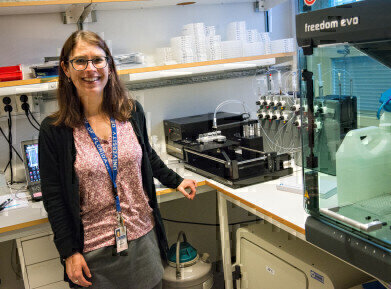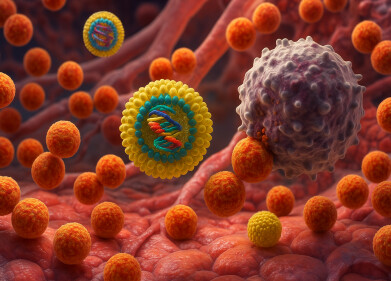-
 Zoë Fisher, Head of DEMAX.
Zoë Fisher, Head of DEMAX.
News
ESS: Pilot Call for Scientific Proposals Open
Mar 27 2019
The successful completion of the European Spallation Source’s DEMAX support laboratory for deuteration and macromolecular crystallisation, as planned for 2018, has prompted a pilot call for scientific proposals in order to gradually establish a system that runs smoothly in time for the first science to be performed on ESS instruments. The service will support small-angle neutron scattering, reflectometry, single-crystal diffraction and spectroscopy – all of which are planned for early operations.
“These techniques for sample preparation are required for all the early instruments, covering science topics as diverse as chemistry, materials science, soft matter research and life science”, said ESS Director for Science Andreas Schreyer. “Piloting this service now allows us to hit the ground running when the first instruments are installed and demonstrate to the world what ESS is capable of.”
The quality and character of the samples placed in the beam need to be of their highest to ensure the best possible output from the instruments and facilities around the world are recognising the need to work actively with users in refining sample preparations. This is particularly true in soft matter research, life scienc, and many aspects of material science, including urgent areas like energy materials.
Two key areas of advanced sample preparation are selective deuteration and macromolecular crystallisation, both covered by the DEMAX scope. DEMAX scientist Hanna Wacklin-Knecht explained: “Selective deuteration of samples in combination with neutron scattering provides a powerful labelling technique that can reveal structural and functional information that no other method can. We can use this to extract information from seemingly hopelessly complex samples. Examples include dispersions of interest for the food industry, multi-component drug targets and exploratory materials with a variety of applications.”
Furthermore, macromolecular crystallisation has proven a revolutionary tool to extract information from biological molecules using synchrotron radiation, resulting in pharmaceutical advances and a number of Nobel prizes. This method has been making slower but steady gains with neutron methods as well and the high neutron brilliance of ESS is expected to change the game, releasing the power of neutron macromolecular crystallography. DEMAX will be ready to enable this development.
The DEMAX pilot call offers an initial range of services in biological and chemical deuteration as well as support for crystallisation, and the first users will probe the samples delivered by DEMAX at other facilities that offer neutrons today. The pilot will allow DEMAX staff to streamline the logistics of user service, building experience and gradually expanding the range of services offered.
“Facilities that offer crystallisation and deuteration support have proven very successful in attracting new users and delivering impact in soft matter and life science research,” said Zoë Fisher, Head of DEMAX. “Developing advanced support labs goes hand-in-hand with developing advanced instruments in order to deliver cutting-edge science. But it’s quite complicated and setting up these services takes several years. This is why we begin now in a small scale, to get the experience we need and to get the functions up and running in time to enable first science. We’re very pleased to invite the science community to take part in this development by submitting proposals.
Visit www.europeanspallationsource.se
Digital Edition
Lab Asia Dec 2025
December 2025
Chromatography Articles- Cutting-edge sample preparation tools help laboratories to stay ahead of the curveMass Spectrometry & Spectroscopy Articles- Unlocking the complexity of metabolomics: Pushi...
View all digital editions
Events
Jan 21 2026 Tokyo, Japan
Jan 28 2026 Tokyo, Japan
Jan 29 2026 New Delhi, India
Feb 07 2026 Boston, MA, USA
Asia Pharma Expo/Asia Lab Expo
Feb 12 2026 Dhaka, Bangladesh


















